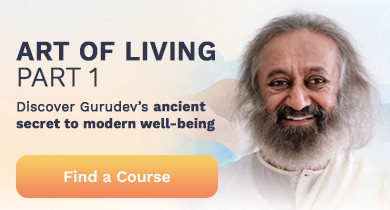By Madhumita Prabhakar | Posted: September 20, 2019
In Indian medicine and spirituality, the channels through which our body’s energy flows are called nadis. And here’s a mind-boggling piece of trivia: there are over 172,000 nadis in the body! As spiritual master Gurudev Sri Sri Ravishankar says, the health of our nadis has the power to affect our physical and mental well-being.
Each nadi triggers a different experience. For example, when we listen to mellow music, we feel calm. Or, when we are at a concert, we feel an adrenaline rush, we feel excited.
Pause for a minute and think about this scenario. How many emotions do you go through a day? Happiness, anger, sadness stress… how many of these trigger points are you able to control? A pretty small portion, right?
There has to be a way to manage our emotions so that we can lead a better quality of life. Here are some quick tips you can follow to be happier and more centered throughout the day!
1. Understand yourself
The best way to understand yourself is to do some introspection. Every time you feel anger, sadness, happiness, jealousy, or any other emotion, ask yourself: why am I feeling this way? For example, if you have a difference of opinion with your spouse, your natural tendency might be to get angry. But when you ask yourself, “Why am I getting angry with them?”, you will be able to partake in the situation more objectively and deal with it better.
Understanding how your mind works is a great way to keep your unpleasant emotions at bay and analyze situations from a neutral perspective.
2. Learn to move on
Throughout our lives, there will be circumstances that trigger some unavoidable emotions. But the trick here is to deal with them just like a child does. Have you observed how children behave? When they are upset, they cry for a few minutes and smile immediately after. Why? Because they don’t hold on to these emotions. They let go. They move on naturally, effortlessly. On the contrary, as adults, we tend to hold on to emotions and circumstances for days, months, or even years.
3. Engage the mind in some activity
One of the best things you can do for yourself is to engage in physical activity for at least 30 minutes in a day. Another is pursuing your interests. The key here is to keep your mind occupied by doing the things that make you happy. It doesn’t matter if it’s playing sports, drawing, writing, painting, or even playing fantasy football: as long as you’re engaged in anything that drives you. When you’re in that state of flow, your mind automatically shifts focus, and your negative emotions take a backseat.
4. Talk to your loved ones
Sometimes just the mere thought of having a loved one around can provide ample comfort in dealing with your negative emotions. Talking to your loved ones gives you strength and helps you relax. When you put your thoughts out into the world, it lessens the burden of carrying them around.
5. Go beyond yourself
One of the best ways to deal with your negative emotions is to go beyond yourself. An easy way to achieve this is by engaging yourself in service. When you help another person, or serve another being, you cultivate the habit of looking beyond just yourself and caring for another person. This way, your negative emotions become insignificant; almost a small dot in your memory.
6. Practice breathing and meditation
In 2016, the Journal of Consciousness and Cognition published the results of a study on the impact of meditation in handling negative emotions. One experiment observed experienced mediation practitioners, and the second observed newcomers to meditation. Before the session, both sets of people were told to recall an experience that made them angry. The former group’s heart rate and breathing were normal, whereas, in the second group, people experienced increased heart rate and high blood pressure.
This was followed by a meditation session. Once again, after the session, both groups were told to recall an experience that made them angry, and the results showed that even new practitioners experienced normal vitals after just one session of mediation.
Now, that’s a solid result of how breathing and meditation can help us manage our emotions, isn’t it? Simply put, this practice lives up to the widespread claims that it calms the mind and improves mental health.
Last of all, and most important of all, remember to consistently practice each of these steps, so that over a period of time, your body and mind are accustomed to dealing with your emotions.
Madhumita Prabhakar is a writer, editor, and blogger. She finds her balance in Sanskrit, music, and meditation.





























